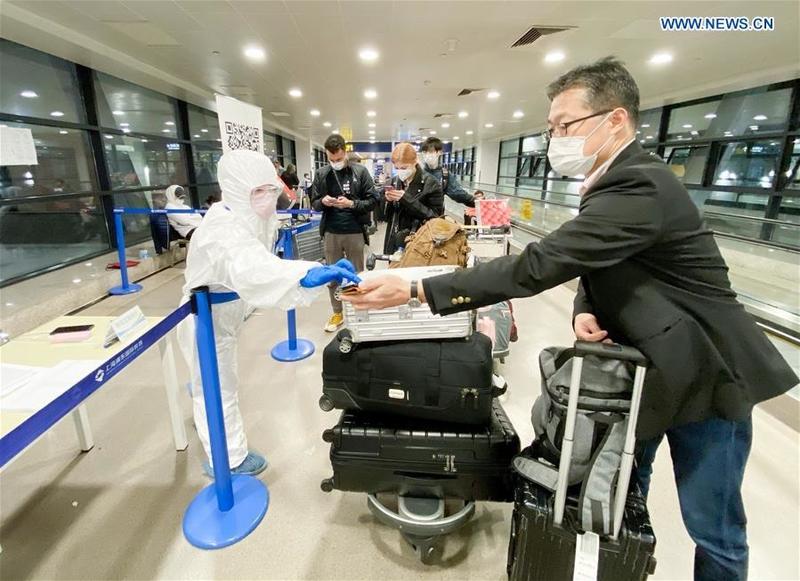 A staff member checks the information of a passenger entering China at Pudong International Airport in Shanghai, east China, March 19, 2020. (DING TING / XINHUA)
A staff member checks the information of a passenger entering China at Pudong International Airport in Shanghai, east China, March 19, 2020. (DING TING / XINHUA)
China will suspend cross-border road transportation for passengers and hold back inbound and outbound tourist services as part of a broader effort to curb the importation of novel coronavirus pneumonia cases, according to a decision made at a meeting chaired by Premier Li Keqiang on Thursday.
The leading group of the Communist Party of China Central Committee's meeting on coping with the COVID-19 outbreak also highlighted the importance of epidemic containment on international flights through stronger cooperation and coordination with other countries.
The country will arrange special parking pads, boarding bridges and passages for all incoming flights from regions hit hard by the pandemic and designate special regions for quarantine at ports to minimize the risks of infection, the group said in a statement.
China will suspend cross-border road transportation for passengers and hold back inbound and outbound tourist services, according to a decision made at a meeting chaired by Premier Li
It also called for seamlessly coordinated efforts in transferring, treating and isolating confirmed and suspected cases and those people's close contacts, saying that individuals who falsify or conceal their infections will be held accountable.
The quick spread of COVID-19 outside China has posed mounting pressure for containment of the outbreak in the country, which is seeing a growing number of imported cases, the group said.
China reported no new locally contracted coronavirus cases for Wednesday, for the first time since the pandemic began months ago, while the spread of the virus accelerated worldwide with the total number of confirmed cases hitting 207,855 on Wednesday, the World Health Organization said.
ALSO READ: COVID-19: Wuhan reports no new infections for first time
The meeting pledged stronger management for international passenger ships and more warnings about cross-border movement of people to reduce unnecessary outbound trips.
Local authorities, especially in regions with a large volume of incoming trips, must beef up preparations in pharmaceuticals, protective materials, emergency treatment facilities, special hospitals and isolation wards, according to the statement.
China will better guide and support its citizens overseas in guarding against infection and continue to do its best to assist epidemic containment abroad, especially in sharing its experience and facilitating other nations' commercial procurement of medical resources, it added.
READ MORE: Premier Li seeks tighter control of cross-border infection
With the majority of provincial areas lowering the level of coronavirus response and most of the country becoming low-risk areas, it is important to restore the normal order of life and work across the board by provincial areas, according to the statement.
It also highlighted the need to speed up help for more businesses to get back to work. Health certificates that facilitate the flow of people and goods between low-risk areas must be nationally recognizable, and no more barriers, including isolation measures for individuals, are required, according to the statement.


